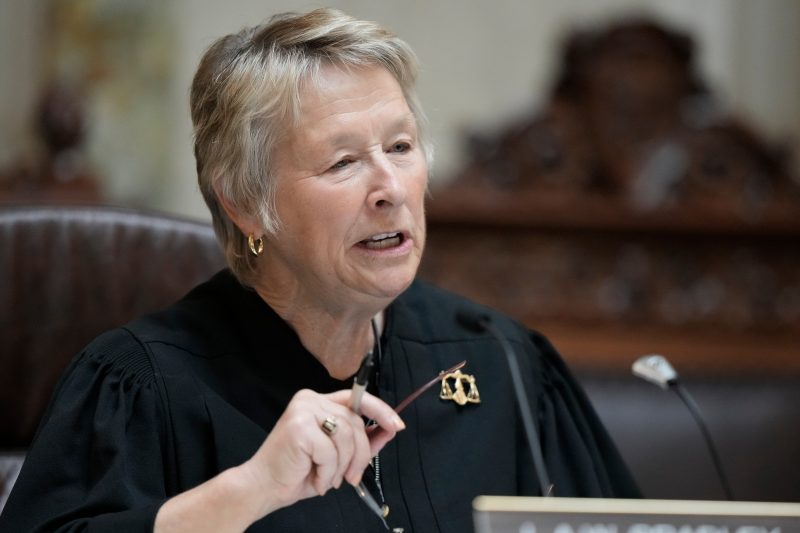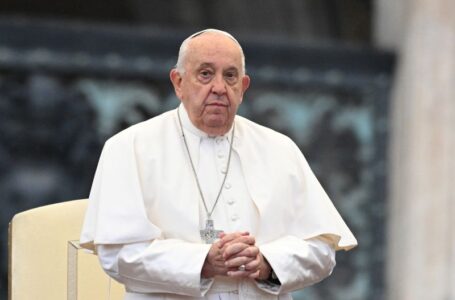Wisconsin Supreme Court liberal won’t run again, shaking up race for control


MADISON, Wis. — The longest-serving member of the Wisconsin Supreme Court’s 4-3 liberal majority announced Thursday she would not run for reelection next spring, shaking up a consequential race in a swing state and improving the odds that conservatives can retake the control they lost last year.
Justice Ann Walsh Bradley, who has served on the court since 1995, told The Washington Post ahead of her announcement that she is confident someone who shares her judicial philosophy can replace her after she completes her term. But her unexpected retirement sets the stage for an intense race for control of the court two years after candidates, political parties and interest groups spent more than $50 million in the most expensive judicial race in U.S. history.
In recent years, the court voted 4-3 to confirm Joe Biden’s win in the state’s last presidential election, ban ballot drop boxes and end a Republican gerrymander of the state legislature. Soon, by a similar margin, it could determine whether abortion remains legal in one of the country’s most closely watched presidential battlegrounds.
Bradley, 73, spent most of the past decade and a half writing dissents for a court run by conservatives. That majority upheld limits on labor unions, approved a voter ID law, limited the powers of the state’s Democratic governor and shut down a campaign finance investigation of Republicans.
Disputes during that era were often bitter and personal, and in one instance turned physical. In 2011, during a confrontation in front of other members of the court, a conservative justice put his hands on Bradley’s neck. No charges were filed, and an ethics investigation into the other justice, David Prosser, fizzled out. Prosser retired from the court in 2016.
The conservatives’ reign on the court ended last year, when voters elected Janet Protasiewicz to the court and liberals gained a 4-3 majority. Bradley celebrated the new direction for the court and in the interview with The Post this week said it was a difficult decision to leave.
“I’ve been in the dissenting mode essentially all of my judicial career,” she said. “I’m delighted at where the court is right now, but it’s just time — time to pass the torch, bring in fresh perspective.”
Bradley said her career on the bench showed she is dedicated to maintaining an independent judiciary, making the courts accessible to all, holding government accountable and protecting people’s rights. “Sometimes the upholding of individual rights is not popular,” she said. “And that’s when it’s needed the most.”
In December, five months after Protasiewicz was sworn in, the court’s liberals struck down election maps that since 2011 have all but guaranteed Republican control of the state legislature. Even before the court ruled, Republican lawmakers discussed impeaching Protasiewicz, saying she had prejudged the redistricting case by calling the GOP maps “rigged” during her campaign. They abandoned the idea amid a political backlash.
Bradley called the proposed impeachment a “threat to the independence of the judiciary” and said “good people” need to stand up to such efforts.
“I don’t know how all of that would have unfolded,” she said. “I’m glad I didn’t have to find out.”
Major cases loom for the court. The justices will hear arguments next month on whether to reverse a 2022 decision by conservatives that banned the drop boxes that voters used in 2020 to return absentee ballots. This fall, the court could be called on to review the outcome of the presidential election, just as it was in 2020.
“Some of these [election-related] cases, of course, come up awfully quickly,” Bradley said. “And that’s exactly how we should handle it then — awfully quickly.”
The court is expected to decide soon whether to accept cases that would determine whether abortion remains legal in the state. If it takes the cases, it will weigh in on the issue soon after the top courts in Florida and Arizona ruled in favor of abortion bans in those states.
Whether the Wisconsin court takes up the cases immediately or waits to hear them later, abortion is expected to be a major issue in the 2025 race. Brad Schimel, a suburban Milwaukee judge, former state attorney general and abortion opponent, in November announced he was running for state Supreme Court. In a statement Thursday on social media, Schimel wished Bradley well and said from the start he had “made it clear that I’m not running against one person, I’m running against this Court’s leftist majority.”
With Bradley out of the race, others will soon jump in. The April 2025 race is crucial for conservatives because they have to defend seats in 2026 and 2027. If they don’t gain control of the court next year, they won’t have an opportunity to do so again until 2028.
Bradley initially planned to seek a fourth 10-year term on the court, announcing on the night Protasiewicz won her seat that she was running for reelection. She changed her mind recently, noting in the interview that she would be 85 by the end of another term on the court. She expressed confidence that she would win if she ran, noting she beat her last opponent, in 2015, by 16 points.
Bradley was the first woman elected to the Wisconsin Supreme Court, after two other women were appointed to the court years earlier. Today, six of the seven justices are women, which Bradley said shows “that a woman has a good chance to win the next Supreme Court election.”
Janine Geske, a former justice who served alongside Bradley in the 1990s, said Bradley put in long hours even when she knew she would be in the minority because she believed the court had a duty to wrestle with tough issues.
“I’ve never seen her waver in her dedication and enthusiasm for the court,” Geske said.











